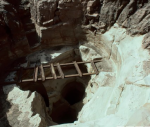You are here
False accusation
Oct 28,2015 - Last updated at Oct 28,2015
While Israeli Prime Minister Benjamin Netanyahu eagerly trumpeted the false accusation that Palestine’s Grand Mufti Haj Amin Al Husseini convinced Germany’s Adolf Hitler to adopt the “Final Solution” envisaging the extermination of Europe’s Jews, Netanyahu did not dare to mention that Zionist leaders collaborated with Hitler in the 1933-36 transfer of 60,000 German Jews and part of their assets to Palestine.
This effort is well-known in Zionist history and its author, Haim Arlosoroff who — although assassinated by a radical Jew — has many streets named for him in Israel. Germany was compelled to reach this deal by a well-orchestrated Zionist economic and financial boycott at a time the country was suffering from the destruction wreaked by World War I, starvation, disease and the Great Depression. Under the accord, the Zionists established the Haavara Trust and Transfer Office Ltd. in Tel Aviv. This office arranged for the travel of German Jews, who swelled the number of Zionist colonists in Palestine, and the use of their assets held in German banks for the purchase of German goods which helped establish the Zionist industrial infrastructure in Palestine.
The deal was important because at the time, the British, under Palestinian pressure, had tried to limit the number of Jews entering the country by requiring a “capitalist certificate” that showed an immigrant had at least $5,000 to invest. This arrangement made the transfer of destitute as well as wealthy Jews possible because both rich and poor could make claims on the assets frozen in Germany. The overall sum invested amounted to the equivalent of $100 million. It is significant that, in the 1880s, Theodor Herzl, the father of the Jewish state, had envisioned just such a company.
Of course, Netanyahu did not mention this deal because the Zionist Revisionist leader Vladimir Jabotinsky was bitterly opposed, arguing that the arrangement would benefit Labour Zionists. Netanyahu’s father was Jabotinsky’s secretary while his Likud has its roots in Jabotinsky’s ideology.
On the issue of Haj Amin, the liberal Israeli daily, Haaretz, seems to suggest that Netanyahu may have consulted an article by a US academic called Joseph Spoerl published in March of this year by the Jerusalem Centre for Public Affairs, a think tank headed by Dore Gold, a longstanding Netanyahu adviser who currently serves as director general of Israel’s foreign ministry. One of the main benefactors of this centre is US casino magnate Sheldon Adelson, a major source of right-wing political campaign funding in the US. Spoerl appears to have raised these claims against Haj Amin to demonise today’s Palestinians who are resisting Israeli occupation.
This is precisely what Haj Amin tried to do throughout his career as a Palestinian religious leader and politician. His father, Tahir Al Husseini, who also served as mufti, was an early opponent of Zionism. Neither were “anti-Semites” (anti-Jewish) like the Nazis but were anti-Zionist because the Zionists, under the post-World War I British mandate, intended to take over Palestine and expel native Palestinians, if one is to believe the writings of Herzl.
An Arab nationalist, Haj Amin was dedicated to the proposed Arab kingdom of Syria under King Faisal I. However, the Arab defeat by France at the battle of Maysalun in 1920 dashed Arab hopes of independence and led to the sharing out of Ottoman territories by France and Britain.
Haj Amin was accused of fostering anti-Zionist riots in 1920 and was jailed by the British but appointed grand mufti of Jerusalem in 1921. He backed the 1936-39 Palestinian revolt and fled Palestine. He took refuge in French-ruled Lebanon and British-dominated Iraq, where many Palestinian opponents of Zionism had been exiled. In accordance with the proposition that the “enemy of my enemy is my friend”, he went to Axis-controlled Italy and, ultimately, Germany where he broadcast propaganda against Britain and the Zionist project in Palestine. During his encounter with Hitler, he asked for German backing for Arab independence as well as the Palestinian struggle against Zionism. In 1947, he opposed the UN partition plan for Palestine.
After the 1948 war, Haj Amin settled in Cairo and established a government-in-exile which was dissolved by Egypt in 1959. He remained a key figure in Palestinian politics until the founding of the Palestine Liberation Organisation in 1964.
Haj Amin was not the only leader from British-ruled countries who applied to the Axis powers for backing for independence struggles. In 1940-41, Rashid Ali Gailani, then prime minister of Iraq, negotiated with Germany with the aim of ousting Britain from his country. Like Haj Amin, he was a committed Arab nationalist and remained so throughout his life. Both he and Haj Amin came from aristocratic families deeply rooted in their countries.
India’s Subhas Chandra Bose also turned up in Berlin in 1941. He had been twice elected president of the Indian National Congress, the main independence movement, and during the war formed the provisional government of free India and the Indian National Army, which fought with the Japanese against British troops in Malaya and Burma. Bose died at the age of 48 after the Japanese imperial bomber in which he was flying crashed in Taiwan. While many Indians reviled Bose, others continue to regard him as a hero of the independence struggle.
Burmese independence activist Aung San fled his country for China in 1940 and eventually travelled to Japan where he established the Burma Independence Army (BIA), which recruited several hundred Burmese expatriate workers. The force remained small until it entered Burma when 12,000 joined. The Japanese dissolved the BIA in 1942 and replaced it with the Burma National Army (BNA), with Aung San in command. But after the Japanese mismanaged their occupation of Burma, the BNA revolted and switched sides. The BNA was transformed into the Burma Army by the British and Aung San became the fifth prime minister of the Crown Colony of Burma. Nevertheless, he is regarded as father of his country. He was assassinated in July 1947, before independence. His daughter, Nobel peace prize laureate Aung San Suu Kyi, is Burma’s leading democratic politician today.
Iraq, India, and Burma eventually won their freedom. Palestine did not thanks to the commitment of Britain and the West to Zionism, made 99 years ago, on November 2, 1917.












